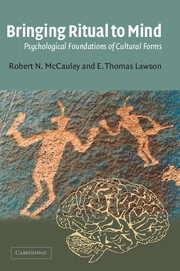Book contents
- Frontmatter
- Contents
- List of figures
- Preface
- 1 Cognitive constraints on religious ritual form: a theory of participants' competence with religious ritual systems
- 2 Ritual and memory: frequency and flashbulbs
- 3 Two hypotheses concerning religious ritual and emotional stimulation
- 4 Assessing the two hypotheses
- 5 General profiles of religious ritual systems: the emerging cognitive science of religion
- Notes
- References
- Index
Preface
Published online by Cambridge University Press: 02 December 2009
- Frontmatter
- Contents
- List of figures
- Preface
- 1 Cognitive constraints on religious ritual form: a theory of participants' competence with religious ritual systems
- 2 Ritual and memory: frequency and flashbulbs
- 3 Two hypotheses concerning religious ritual and emotional stimulation
- 4 Assessing the two hypotheses
- 5 General profiles of religious ritual systems: the emerging cognitive science of religion
- Notes
- References
- Index
Summary
Slightly more than a decade ago we published a book, Rethinking Religion: Connecting Cognition and Culture, in which we launched the cognitive science of religion. For all of the froth that accompanies encounters between the humanities and the cognitive sciences on university campuses, everyone knows that the best work in each area regularly looks to the other for inspiration and correction. Our goal is not to supplant traditional work in religious studies but to supplement it. If our work seems tilted too far toward the scientific, it is only because we aim to redress an imbalance -an imbalance in strategy and approach that favors the particular over the general, the idiosyncratic over the systematic, and the interpretive over the explanatory (as if we could make sense of either item in each pair in isolation from the other). What we are out to do is to help bring an end to the defensive pronouncements of humanists and, especially, of scholars of religion concerning what the sciences can never address productively. Who knows what the sciences can or cannot address productively? Only time and a great deal of hard work will tell.
We should emphasize that this aspiration is not born of any undue confidence about the truth of the proposals we advance. (What we take up are, after all, empirical matters.) What should be most striking are the tremendous difficulties connected with even articulating testable theories in these domains, let alone testing them.
- Type
- Chapter
- Information
- Bringing Ritual to MindPsychological Foundations of Cultural Forms, pp. ix - xivPublisher: Cambridge University PressPrint publication year: 2002

